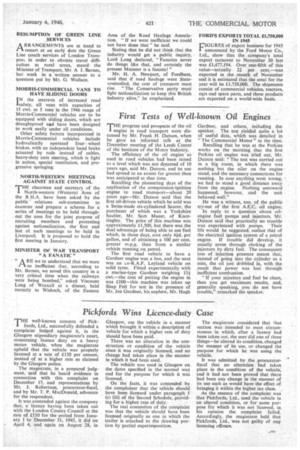First Tests of Well-known Oil Engines T HE progress and prospects
Page 23

If you've noticed an error in this article please click here to report it so we can fix it.
of the oil engine in road transport were discussed by Mr. Frank H. Dutson, when he gave an informal talk at the December meeting of the Leeds Centre of the Institute of the Motor Industry.
The efficiency of the oil engine as used in road vehicles had been raised to a level which was not drsamed of 10 years ago, said Mr. Dutson, and its use had spread to an extent far greater than was anticipated at that time.
Recalling the pioneering days of the application of the compression-ignition engine to road transport—about 20 years ago—Mr. Dutson said that the first oil-driven vehicle which he sold was a Swiss-made six-cylindered Saurer, the purchaser of which was a Yorkshire haulier, Mr. Sam Maeer, of Knottingley. The price of this machine was approximately £1,500, but there was the dual advantage of being able to use fuel which, in those days, cost only 40. per gallon, and of obtaining a 100 per cent. greater m.p.g. than from a similar vehicle running on petrol.
The first road vehicle to have a Gardner engine was a bus, and the next was an Lx-R.A.F. Leyland vehicle on solid tyres. Fitted experimentally with a marine-type Gardner weighing 13i cwt.—the cost of putting the engine in was £100—this machine was taken up Shap Fell for test in the presence of Mr. Joe Gardner, his nephew, Mr. Hugh Gardner, and others, including the speaker. The test yielded quite a lot of useful data, which was detailed in "The Commercial Motor" at the time.
Recalling that he was at the Perkins works on the morning that the first Perkins oil engine was tried out, Mr. Dutson said: "The test was carried out in a big room, in which there was nothing but the oiler on the engine stand, and the necessary connections for running. In case anything went wrong, ' we had to stand a good distance away from the engine. Nothing untoward happened. however, and the unit behaved well."
He was a witness, too, of the public try-out of the first A.E.C. oil engine.
In reply to a question about oilengine fuel pumps and injectors, Mr. Dutson said that practically no trouble was experienced with pumps. 'Their life would he suggested, outlast that of the electrical ignition system of a petrol engine. If trouble did develop, it usually arose through choking of the injectors by dirty fuel. The consequent loss of. injection pressure meant that, instead of going into the cylinder as a mist, the oil just dribbled in, with the result that power was lost through inefficient combustion.
"If your injectors and fuel be clean, then you get maximum results, and, generally speaking, you do not have trouble," remarked the speaker.




























































